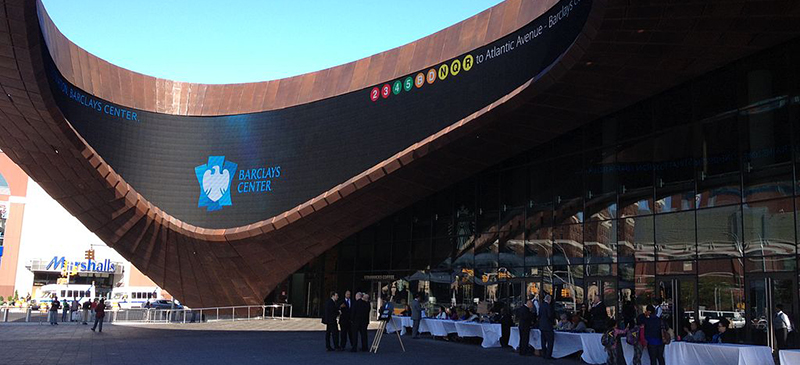Having made it to the final round of consideration, Brooklyn is competing with Philadelphia and Columbus to host the 2016 Democratic National Convention. A win would bring some 5,000 delegates and journalists to the Barclays Center, and, for a short period in July or August, make Brooklyn the center of the political universe. There’s no clear timetable on when the decision is expected. Democratic National Committee Chair Debbie Wasserman Schultz said last week that the decision would come “in the next few months.” The DNC has a subcommittee that processes the bids and visits the candidate host cities, but the decision rests with the party leadership.
Whatever city the leaders pick, they will be trying to send a message. But experts disagree on what message that may be, and many of them doubt whether the choice makes much of an impact on the electorate anyway.

Some conventional thinking has it that the nominating convention should be held in a swing state, and if that’s the case, Ohio is the clear favorite. It has been a critical swing state for each of the last four presidential elections and will likely have another close vote. The GOP’s choice of Cleveland in 2016 lends credibility to this theory.
That the Democratic Party should hold its convention in a swing state is at the crux of Columbus Mayor Michael Coleman’s pitch. “Ohio is the most sought after swing state, and it’s more important than ever that Columbus hosts the 2016 Democratic National Convention,” he said in an emailed statement last week.
But looking at both parties’ city choices for nominating conventions over the past thirty years casts a doubt on the swing state rationale. Since 1972, only 7 out 22 nominating conventions have been held in swing states, defined as states where the elections were won by a margin less than 5 percent of votes. Both the Democrats and Republicans opted for swing states in 2008 and 2012.
Only in two cases since 1972 did holding a nominating convention in a swing state coincide with a favorable outcome. The Democrats narrowly carried New York in 1976 after holding a convention there and they did the same in 2008, when they held a convention in Denver and took Colorado. In both cases, larger factors contributed to the wins. Republicans failed to carry Florida after holding their convention there in 2012.
Does the choice of a convention city really matter? Larry Harris, of Mason-Dixon Polling and Research, says there is no evidence that voters make their pick based on where the convention was held. “The parties pick swing states for optics but statistically it is not significant,” he said, but he added that the choice “can contribute in a small way to the overall narrative.”
 “The selection of a convention state can have symbolic meaning but it’s unlikely to make an electoral impact,” says Berwood A. Yost, Director of the Center for Opinion Research at Franklin and Marshall College. “It doesn’t matter except to the community where it is held.”
“The selection of a convention state can have symbolic meaning but it’s unlikely to make an electoral impact,” says Berwood A. Yost, Director of the Center for Opinion Research at Franklin and Marshall College. “It doesn’t matter except to the community where it is held.”
If indeed there’s no advantage to holding the convention in a swing state, then New York has some clear advantages for the Democratic Party.
Robert Shapiro, a Columbia University political science professor, said campaign financing factors into the decision—a fact which bolsters New York’s prospects. “From a fundraising perspective, it’s a very friendly environment here,” Shapiro said.
But if the decision rested on fundraising alone, Manhattan would likely be the choice over Brooklyn, given the concentration of wealth in that borough.” Still, Mayor Bill de Blasio’s choice to push Brooklyn—rather than Manhattan—likely reflects more than just a loyalty to his home borough. Brooklyn may be a smart strategic choice.
“What place could better exemplify the issues the party will be highlighting?” asks Bob Liff, a Democratic political consultant, referring to Brooklyn’s large immigrant population. “Brooklyn has captured the public’s imagination. It is a much more interesting choice than Manhattan.”
A veteran of several Democratic conventions, Liff says the gathering is also an opportunity to let off some steam. “The convention is a big party and the DNC’s decision is where the people want to go for a party.” For Liff, a Brooklyn native and current resident, that choice is clear. New York puts on “the best show on Earth,” he says. “We are the center of the Democratic universe, we like to show off and we don’t want anyone else to get it over us.”
Not all New Yorkers are as enthusiastic. New York’s Sergeants Benevolent Association has come out against de Blasio’s bid. Union President Ed Mullins is concerned the convention will lead to protests and cast the police in a negative light at a time when the public is already on edge due to high profile cases of alleged police misconduct.
“They are going to send the cops to police the convention and we know there’ll be protests—and then there will be lawsuits—and no one is supporting the police,” he says. “It’s almost inviting trouble.”


Leave a Reply